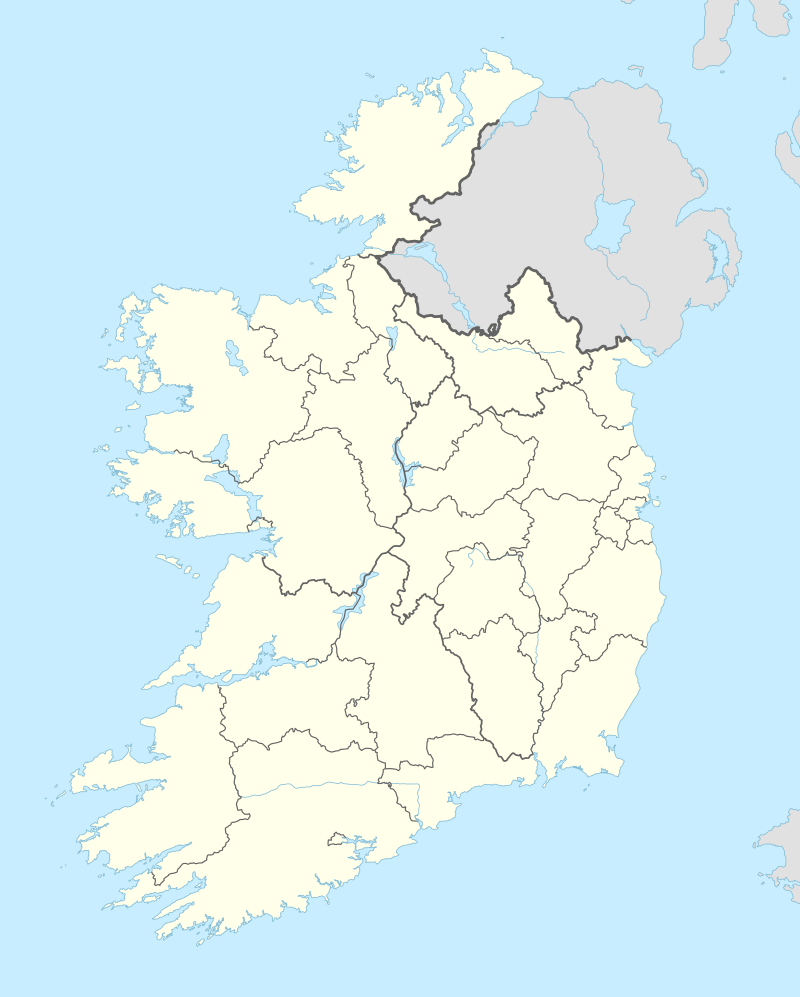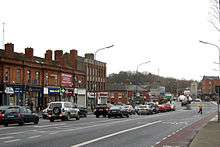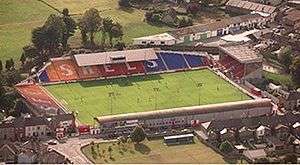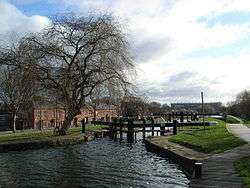Drumcondra, Dublin
| Drumcondra Droim Conracu | |
|---|---|
| District and suburb of Dublin | |
|
The Royal Canal passing through Drumcondra | |
 Drumcondra Location in Ireland | |
| Coordinates: 53°22′05″N 6°15′22″W / 53.368°N 6.256°WCoordinates: 53°22′05″N 6°15′22″W / 53.368°N 6.256°W | |
| Country | Ireland |
| Province | Leinster |
| County | Dublin City Council |
| Elevation | 25 m (82 ft) |
| Population (2006)[1] | |
| • Urban | 8,637 |
| Irish Grid Reference | O158368 |
Drumcondra (Irish: Droim Conrach, meaning "Conra's Ridge") is a residential area and inner suburb on the Northside of Dublin, Ireland. It is administered by Dublin City Council.[2] The River Tolka and the Royal Canal flow through the area. Drumcondra is also a parish in the Fingal South West deanery of the Roman Catholic Archdiocese of Dublin.
History
The village of Drumcondra was the central area of the Parish of Clonturk, and the two names were used equally for the religious and civil parishes, but the new suburban district of Drumcondra now also encompasses the old Parish of St.Mary.
The Cat and Cage Pub on the Drumcondra Road was the site of an old postal stop and the point at which rebels, during the 1798 rebellion, seized a postal cart in order to signal to others in north County Dublin to revolt. The Cat and Cage is located at the corner of Church Avenue.
Under the Dublin Boundaries Act which received the Royal Assent on 6 August 1900, Drumcondra became part of the urban area of Dublin City. The Local Government (Dublin) Act, 1930, First Schedule, Part I lists the townlands of Drumcondra Rural as : Clonturk, Furrypark, Hampstead Hill, Hampstead South, Killester North, North Bull, Puckstown, and Sibylhill. Part II lists the Portions of Townlands as : Killester Demesne, Harmonstown, and Artaine South.
Transport

- The district is served by Drumcondra railway station, on the main Drumcondra road. The station initially opened on 1 April 1901 but closed on 1 December 1910[3] with the termination of Kingsbridge (now Heuston Station) to Amiens Street (now Connolly Station) services. Part of the original building was demolished in late 1918. It reopened on 2 March 1998 as a station on the Maynooth/Longford commuter line.
- The proposed Metro line from Dublin city centre to beyond Dublin Airport is scheduled to be linked with Drumcondra railway station.[4]
- Many Dublin Bus routes serve the Drumcondra area, such as the 11, 13, 16, 33, 41 and 41C amongst others. In addition the Aircoach express coach service to Dublin Airport stops at the Railway station.
Features
One of the main sights of Dublin is Croke Park, where Ireland's national games of Gaelic football and hurling may be seen. Boasting a capacity for 82,300 people, it is one of the largest sports stadiums in Europe.[5] 'Croker' (as it colloquially known) is the headquarters of the Gaelic Athletic Association and also houses the official GAA Museum (on St Josephs Avenue, which is off Clonliffe Road).[6] The stadium has the right to host the final matches of the All-Ireland Senior Football Championship and All-Ireland Senior Hurling Championship. The stadium is a 20-minute walk from Dublin city centre, or a 5-minute bus ride.
Fagan's Public House, Drumcondra Road Lower. Bertie Ahern took U.S. President, Bill Clinton, here in September 1998.
Kennedys Pub on Lower Drumcondra Rd is one of the oldest pubs in Drumcondra, predating Fagans by a number of years. Formerly called McPhilips, its been named Kennedys since 1961.

Tolka Park the home of League of Ireland side Shelbourne is situated on Richmond Road.
The National Council for the Blind at Whitworth Road, is located near the Church of St. George cemetery.
Education
Primary schools
- Drumcondra N.S. (for boys and girls), Church Avenue, Church Of Ireland.
- St Patrick's N.S. (for boys), Roman Catholic, parish of Drumcondra.
- Corpus Christi N.S. (for girls), Home Farm Road, Roman Catholic, parish of Drumcondra.
- St. Joseph's School For Children with a Visual Impairment, (for boys and girls), Roman Catholic, parish of Drumcondra.[7]
Secondary Schools
- Domincian College Griffith Avenue (Girls)
- PobalScoil Rosmini (mixed)
- Maryfield College (Girls)
Third level
Three colleges associated with the Roman Catholic Church and Dublin City University are located in Drumcondra:
- All Hallows College
- Mater Dei Institute of Education
- St Patrick's College of Education - for the training of national school teachers.
Religion
The oldest church in the district is Drumcondra Church (Church of Ireland), located at the bend of Church Avenue, abutting All Hallows College. Several notable people including Georgian-period architect James Gandon are buried in the adjoining graveyard.
The "Old Church of St.George" was built about 1668 in Lower Temple Street (changed to Hill Street in the 1800s), then a part of Drumcondra. The Tower of the Old Church of St. George can still be seen in Hill Street and its gravestones are around the walls of what is now a playground.[8][9][10][11][12]
The "New Church of St.George" was built on the square further up the road at the end of Temple Street in the early 1800s. The original site acquired for the new church was on Whitworth Road, but then the present site was selected, which at the time was open fields. A temporary chapel was built on the Whitworth Road site and its churchyard was retained when St. George's was completed - this site was later taken over by the Whitworth Hospital (later named Drumcondra Hospital). The gravestones can be seen behind the Hospital.[13][14]
In the Catholic church, Drumcondra is served by the Church of Corpus Christi at Home Farm Road. The palace of the Roman Catholic Archbishop of Dublin is situated alongside Clonliffe College (the diocesan seminary). Together they occupy an extensive site bounded by Clonliffe Road and the Drumcondra Road (to the South and West) with the River Tolka at the northern extremity.
The Respond! Housing Association has its Dublin office located in High Park, Drumcondra, where it also runs training courses in Housing and Social care provision.
Sport

Drumcondra is home to Croke Park and Tolka Park soccer stadium, the permanent home of Shelbourne F.C. since 1989, 'The Reds' have hosted major European clubs such as Panathinaikos and Steaua Bucharest in the Drumcondra venue. The Club has won the league six times and the FAI Cup four times since moving to Tolka Park. The park was also the base for Drumcondra F.C. (Drums) which was a League of Ireland club from 1928-1972 before it was merged with fellow Dublin club Home Farm, now based in nearby Whitehall. Drumcondra FC, who played their home games at Tolka Park stadium, was a successful side in the post World War II years, winning five Irish league titles between 1948 and 1965 as well as competing in the European Cup and Inter-Cities Fairs Cup on several occasions.[15]
The name lives on today in the shape of Drumcondra FC.[15]
The Ierne Sports Club is situated off Grace Park Road, Rosmini Gaels (GAA) is also based in Drumcondra.
People
- Nevill Coghill, Victoria Cross recipient[16]
- Richard Kirwan, scientist
- Bertie Ahern, Taoiseach
- Eamon Dunphy, football player and broadcaster
- Gabriel Fallon, Abbey actor
- Charles Franklin, motorcycle racer and designer [17]
- Aidan Gillen, actor
- Michael Holohan, composer and member of Aosdána.
- Fintan O'Toole, journalist
- Peadar O'Donnell (1893-1986), Irish socialist republican revolutionary, lived at 174 Upper Drumcondra Road
- Eoin Hand, football player and manager
- Thomas Tickell, poet
- James Joyce, writer
- Seán O'Casey, playwright
- Dermot Bolger, writer
- Michael Feeney Callan, writer[18]
- Alan Glynn, writer[19]
- Emmet Dalton, soldier and film producer[20]
- Sarah Atkinson, writer and philanthropist, lived for thirty years on Drumcondra Hill[21]
- Noel Rock, politician
- Orla Gartland, popular singer extraordinaire[22]
See also
References
- ↑ "Census 2006 – Volume 1 – Population Classified by Area" (PDF). Central Statistics Office Census 2006 Reports. Central Statistics Office Ireland. April 2007. Retrieved 2011-06-05.
- ↑ According to the "Local Government Act, 2001", section 10(2): "The State continues to stand divided into local government areas to be known as counties and cities which are the areas set out in Parts 1 and 2, respectively, of Schedule 5." It is clear from SCHEDULE 5, Local Government Areas (Counties and Cities, PART 1, that "Dublin" is defined as a city (as distinct from a county).
- ↑ "Drumcondra station" (PDF). Railscot - Irish Railways. Retrieved 2007-08-31.
- ↑ Metro line from the city centre to beyond Dublin Airport
- ↑ Capacity Croke Park web site
- ↑ Croke park web site
- ↑ Primary Schools in Dublin 9
- ↑ Dictionary of Dublin and its neighbourhood
- ↑ The Irish Times, 26 Nov 1894, p.3, and 28 Dec 1898 p.6
- ↑ Dublin Corporation Reports 1892 Vol.I, 370 & Vol.II, 421-2 & 505
- ↑ Minutes of the Municipal Council of the City of Dublin 1891, 302.
- ↑ 25i map of 1906-9, Ordnance Survey of Ireland. St.George's Chapel & remains of Grave Yd (Disused) Hill Street
- ↑ "St. George's church re-opened". The Irish Times. 14 December 1961. p. 9.
- ↑ Dictionary of Dublin and its neighbourhood, (1908) by E. MacDowell Cosgrave, M.D. Member of Council, Royal Society of Antiquaries of Ireland and Leonard R. Strangways, M.A., Senior Moderator, Dublin University : M.R.I.A.. p. 109 Little St.Georges Chapel in Hill St. p. 110 Church of St George in George's Place at the junction of Eccles, Temple and Hardwick Streets.
- 1 2 About Drumcondra FC web site
- ↑ http://www.historyireland.com/18th-19th-century-history/a-fathers-tribute-the-war-trophies-of-lieutenant-nevill-coghill-vc/
- ↑ "The History of the Indian Motorcycle The People behind the Indian". IIndian Motorcycle Classics. Retrieved 5 May 2014.
- ↑ "A Workshop in France - Art by Michael Feeney Callan" (PDF). Retrieved 2013-04-23.
- ↑ "Born at this place" Evening Herald
- ↑ Cottrell, Peter (2008). The Irish Civil War 1922-23. Osprey Publishing. p. 60. ISBN 9781846032707.
- ↑ Matthew Russell in the Irish Monthly
- ↑ "She's got it covered" The Sunday Times
| Wikimedia Commons has media related to Drumcondra. |
